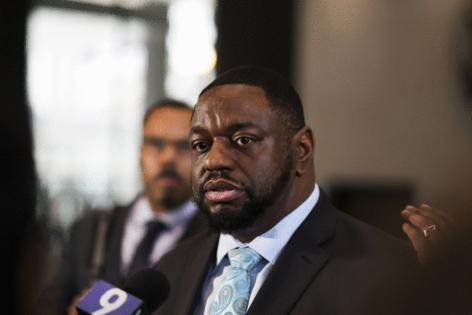Illinois state Sen. Emil Jones III to face retrial on bribery charges in 2026 -- when he'll also be up for reelection
Published in News & Features
CHICAGO — State Sen. Emil Jones III will face retrial on bribery charges in January 2026, a year when he’ll also be up for reelection to a seat bequeathed in classic Illinois fashion by his well-known father.
U.S. District Judge Andrea Wood on Friday set a trial date of Jan. 12, which will be nine months after his first trial ended in a mistrial when a jury deadlocked on all counts.
If he chooses to run, Jones will have to submit signatures to get on the ballot by late November, a little over a month before his trial. The case, which is expected to last three or four weeks, would be long over before the Democratic primary in March, and a conviction would almost certainly force him from the ballot.
The timing of the retrial also means Jones, the son of former state Senate President Emil Jones Jr., will have served out almost an entire four-year term in the General Assembly while the charges were pending.
After he was charged in October 2022, Jones resigned from his leadership post and position as chairman of the Senate Licensed Activities Committee, and some Democratic leaders, including Gov. JB Pritzker, called on him to resign from his $72,906-per-year Senate seat entirely.
Instead, Jones remained on the ballot in the November 2022 election, where he was running unopposed, and was reelected to a fourth term that expires in January 2027. Jones’ 14th District covers parts of the city’s South Side as well as near south suburbs such as Riverdale, Calumet Park, Blue Island and Robbins.
Jones, 46, a Chicago Democrat, is accused of agreeing to take bribes from an executive of a red-light camera company in exchange for Jones’ protection in Springfield against legislation that would hurt the company’s bottom line.
Wood declared a mistrial April 24 after the jury at least twice reported they could not reach a verdict. The jury of seven women and five men had deliberated for about 24 hours over four days before announcing they were deadlocked.
During Friday’s hearing, prosecutors said they expect to call up to five additional witnesses the second time around, including former state legislators who will testify about the process of legislation and other nuts-and-bolts of the General Assembly in Springfield.
Jones’ retrial will come more than six years after FBI agents confronted Jones at his Roseland neighborhood home as part of a sweeping investigation into bribery schemes involving red-light cameras, liquor licenses and other graft across the west and southwest suburbs.
At the heart of the probe was Omar Maani, co-founder of SafeSpeed LLC, who agreed to work undercover for federal investigators after being confronted with evidence he was paying off officials in Oak Lawn in exchange for political support to add SafeSpeed cameras at additional intersections.
According to the charges, Jones agreed to accept $5,000 in campaign funding from Maani in exchange for Jones agreeing not to file a bill calling for a statewide study of red-light cameras, which SafeSpeed considered potentially damaging to its bottom line. Jones also offered to “protect” the company from his friend, then-state Rep. David McSweeney, who had filed bills of his own calling for an all-out ban of red-light cameras, according to prosecutors.
The charges allege Jones also asked Maani to give his former office intern a part-time job, which led to $1,800 being paid to the intern in exchange for no work.
At his first trial, Jones made the risky decision to testify in his own defense, telling the jury his namesake father, who spent nearly 40 years in the General Assembly before retiring in 2008, inspired him to go into politics.
“Ever since I was a child, I always wanted to be a state senator like my father and I decided to run,” Jones testified in April, leaving out that his father had retired abruptly after winning the primary and pitched his son as his replacement to favorable Democratic committeemen.
Jones told the jury he’s run unopposed ever since winning that first election. Asked by his attorney, Victor Henderson, if he still had to raise money, Jones said, “I never had an election. I never had an opponent to run against. So … no.”
But he still had a fund, Friends of Emil Jones, “to raise funds for my campaign if I ever had one,” Jones said.
State campaign records show that campaign fund had about $148,000 in its coffers as of the last filing in mid-April.
____
©2025 Chicago Tribune. Visit at chicagotribune.com. Distributed by Tribune Content Agency, LLC.







Comments